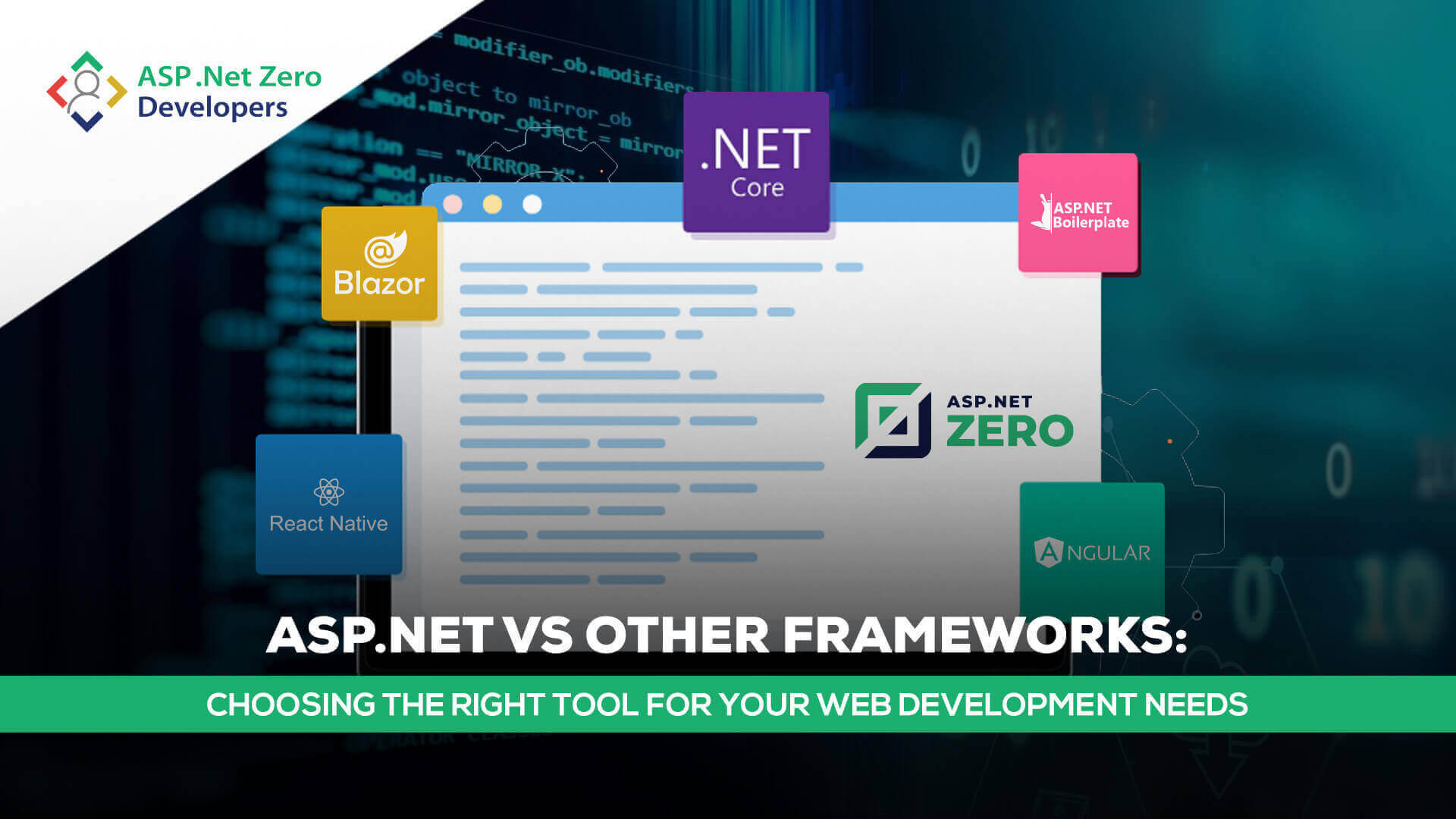ASP.NET vs Other Frameworks: Choosing the Right Tool for Your Web Development Needs
In the ever-evolving landscape of web development, choosing the right framework is essential for building scalable, secure, and feature-rich applications. Among the myriad of options available, ASP.NET stands out as a powerful and versatile framework developed by Microsoft. In this blog post, we will compare ASP.NET with other popular frameworks, highlighting their strengths, weaknesses, and use cases to help you make an informed decision for your next web development project.
1. ASP.NET vs. Angular:
ASP.NET:
- Developed by Microsoft, ASP.NET is a server-side web application framework that allows developers to build dynamic websites and web applications using C#.
- Known for its robustness, scalability, and integration with other Microsoft technologies such as Azure and Visual Studio.
- Provides a wide range of features including built-in security, authentication, and authorization mechanisms.
Angular:
- Developed by Google, Angular is a client-side JavaScript framework for building single-page web applications.
- Offers a powerful and intuitive development experience with features like two-way data binding, dependency injection, and modular architecture.
- Ideal for building complex, interactive web applications with a rich user interface.
Use Case: Choose ASP.NET for enterprise-level web applications requiring tight integration with Microsoft technologies. Opt for Angular for building dynamic, single-page applications with complex user interfaces.
2. ASP.NET vs. React:
ASP.NET:
- Offers a comprehensive development ecosystem with ASP.NET Core for server-side logic and ASP.NET MVC for building web applications.
- Provides seamless integration with Visual Studio and Azure for efficient development, testing, and deployment.
- Ideal for building large-scale, enterprise-grade applications with high performance and security requirements.
React:
- Developed by Facebook, React is a JavaScript library for building user interfaces, particularly for single-page applications.
- Offers a component-based architecture, virtual DOM, and one-way data binding for building interactive and responsive UIs.
- Highly flexible and extensible, allowing developers to integrate with other libraries and frameworks as needed.
Use Case: Opt for ASP.NET when building complex, enterprise-level applications with integrated server-side logic. Choose React for building dynamic and interactive user interfaces in single-page applications.
3. ASP.NET vs. Node.js:
ASP.NET:
- A server-side web application framework developed by Microsoft for building dynamic, data-driven web applications.
- Offers a rich set of features including built-in authentication, authorization, and data access capabilities.
- Integrates seamlessly with other Microsoft technologies such as Azure and SQL Server for enterprise-grade scalability and reliability.
Node.js:
- A server-side JavaScript runtime built on Chrome’s V8 JavaScript engine for building scalable, real-time applications.
- Known for its lightweight and event-driven architecture, making it ideal for building high-performance, data-intensive applications.
- Provides a vast ecosystem of libraries and modules through npm, enabling developers to leverage existing solutions and accelerate development.
Use Case: Consider ASP.NET for enterprise-level applications requiring tight integration with Microsoft technologies. Choose Node.js for building real-time,
data-intensive applications with a lightweight and scalable architecture.
4. ASP.NET vs. Django:
ASP.NET:
- Developed by Microsoft, ASP.NET is a server-side web application framework known for its robustness, scalability, and integration with other Microsoft technologies.
- Offers a comprehensive development ecosystem with features such as ASP.NET Core, ASP.NET MVC, and Entity Framework for building dynamic web applications.
- Provides built-in security mechanisms, authentication, and authorization features for enterprise-grade applications.
Django:
- A high-level Python web framework that encourages rapid development and clean, pragmatic design.
- Known for its simplicity, flexibility, and emphasis on DRY (Don’t Repeat Yourself) principles.
- Provides built-in features such as an ORM (Object-Relational Mapper), admin interface, and authentication system for rapid prototyping and development.
Use Case: Consider ASP.NET for enterprise-level applications requiring tight integration with Microsoft technologies and extensive built-in features. Opt for Django for rapid development of data-driven web applications with a focus on simplicity, flexibility, and clean design principles.
5. ASP.NET vs. Laravel:
ASP.NET:
- Developed by Microsoft, ASP.NET is a mature and comprehensive web development framework for building scalable, secure, and feature-rich applications.
- Offers a wide range of features including ASP.NET Core, ASP.NET MVC, and Entity Framework for building modern web applications.
- Provides seamless integration with other Microsoft technologies such as Azure and Visual Studio for efficient development, testing, and deployment.
Laravel:
- A PHP web application framework known for its elegant syntax, expressive codebase, and developer-friendly features.
- Offers a wide range of features including routing, ORM, authentication, and templating engine for building modern web applications.
- Provides a vibrant ecosystem of packages and libraries through Composer, enabling developers to extend and customize their applications as needed.
Use Case: Choose ASP.NET for enterprise-level applications requiring extensive built-in features, tight integration with Microsoft technologies, and scalability. Opt for Laravel for rapid development of PHP-based web applications with a focus on elegant syntax, expressive codebase, and developer productivity.
Conclusion:
While ASP.NET offers a robust and comprehensive development ecosystem for building enterprise-grade web applications, other frameworks such as Angular, React, and Node.js provide unique advantages for specific use cases. When choosing a framework for your web development project, consider factors such as scalability, performance, integration capabilities, and developer expertise to ensure the success of your application. Whether you choose ASP.NET or another framework, the key is to select the right tool for the job based on your project requirements and business objectives.

